One of the great joys of reviewing movies is the opportunity to attend film festivals. They offer moviegoers a chance to see multiple offerings in myriad genres from countries all over the globe, featuring everything from little-known independent productions to Hollywood blockbusters. And so it is with my hometown event, the Chicago International Film Festival, which just recently completed its 55th edition.
The Chicago festival just keeps getting better and better every year. I’ve attended many of the festivals over the past 40 years (I started attending when I was 2…), and I’ve seen vast improvements in programming and staging in that time, efforts that have truly made this a world class event. Over 12 days, I screened 15 films, many of which were good to excellent.
With that in mind, I offer my thoughts and impressions on the pictures I saw. My scores, which are based on the 1-5 rating scale used by festival attendees, appear at the end of each of my evaluations. Lengthier reviews of some of these releases will be featured in future blog entries.
So sit back, relax and enjoy my journey through an inspired field of movies. And, if you should ever attend this event in the future, be sure to look for me on the red carpet. I’ll be there!

Photo by Trevor Laster.
“Babyteeth” (Australia)

The seemingly unlikely romance between a seriously ill teenager (Eliza Scanlen) and a junkie/small-time drug dealer (Toby Wallace) outrages her parents (Ben Mendelsohn, Essie Davis), despite the fact that mom and dad each engage in their own bad behavior and have more than their own share of issues. Yet, as this story plays out, it becomes apparent that those who are supposed to provide guidance can learn much from those they’re guiding.
With a tautly written script, a superb ensemble cast (especially Mendelsohn in one of his best performances), creative cinematography and a more than ample supply of quirky humor, this excellent debut feature from director Shannon Murphy ushers the audience through a minefield of emotions (especially in the film’s concluding sequence), leaving viewers moved – and drained – by picture’s end. Think of this as a slightly off-the-wall, bittersweet and decidedly more dysfunctional version of “Terms of Endearment” (1983), and you have the idea. A superb offering from a promising new talent. Don’t miss it. (5/5)

A seriously ill teenager (Eliza Scanlen) ponders an uncertain future in director Shannon Murphy’s debut feature, “Babyteeth.”
“Ordinary Love” (UK)
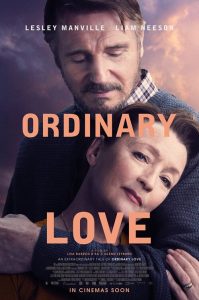
This sensitive, highly personal look at what a breast cancer diagnosis does to longtime happily married couple (Lesley Manville, Liam Neeson) evokes heartfelt emotions as the story wends its way through the ups and downs of coping with illness and an uncertain future. And, coming in the wake of the tragic and unexpected death of their only child, this latest burden is made all the more difficult for a wife and mother facing her own mortality and a husband and father staring down the prospect of being alone.
Directors Lisa Barros D’sa and Glenn Leyburn draw excellent award-worthy performances out of their two protagonists (especially Manville), presenting the audience with a couple who exude a comfortable familiarity at both their best and worst. The picture’s simple but effective cinematography and suitably fitting soundtrack greatly enhance the mood of the story, taking a subject that’s been addressed on film before and elevating it to an entirely new level of candor and viewer intimacy. A moving, exceedingly touching experience to be sure. (5/5)

A breast cancer patient (Lesley Manville, right) and her concerned husband (Liam Neeson, left) struggle to cope with the changes to their long-tenured relationship in “Ordinary Love.”
“Spider” (“Araña”) (Chile)

When a believed-dead right-wing Chilean nationalist (Marcelo Alonso) reappears decades after working with the radical Fatherland and Liberty movement to overthrow the Communist government of President Salvadore Allende, old ghosts from the past re-emerge from the woodwork, circumstances that create havoc for the story’s principals both personally and publicly. Told through a series of flashbacks seamlessly woven into the present-day narrative, the film reveals a complex political struggle that spills over from the day’s public events and into the personal lives of the movement’s participants (and vice versa), both in the past and the present.
Director Andrés Wood delivers an engaging, edge-of-your-seat thriller with both personal and public implications, as well as a message that’s just as important for today as it was in the past, and not just in Chile. “Spider,” a nominee for the festival’s Gold Hugo Award, the event’s highest honor, is yet another excellent example of the work coming out of one of the world’s foremost emerging film industries. (5/5)

Right-wing radicals (Maria Valverde, left, and Gabriel Urzúa, right) work on planning strategies to overthrow Chile’s leftist leadership in the early 1970s in director Andrés Wood’s Gold Hugo-nominated offering, “Spider” (“Araña”).
“Balloon” (“Qi Qui”) (China)
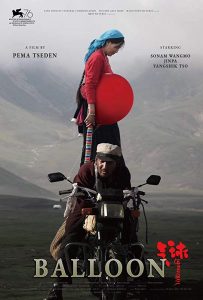
This paradoxical fable explores what happens when long-cherished spiritual beliefs collide with sociopolitical public policy in Tibet during the days of China’s one-child birth policy. To say more would reveal too much, but suffice it to say that the picture weaves a lush tapestry of thoughts and feelings that grows ever-more captivating the further one gets into its narrative.
Poetically told by director Pema Tseden, with inventive and often-breathtaking cinematography, an elegant soundtrack, gentle humor and an ethereal storytelling approach, this simple but stirring tale moves viewers in heartfelt ways at both ends of the emotional scale. While the pacing of this Gold Hugo nominee and best screenplay winner is a tad sluggish in the middle, that’s easily overlooked in light of everything else this excellent release has to offer. (5/5)

The clash of traditional spirituality and modern government policy affect three generations of a Tibetan family in director Pema Tseden’s “Balloon” (“Qi Qui”).
“The Father” (“Bashtata”) (Bulgaria/Greece)
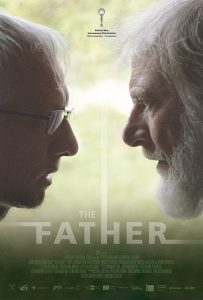
This touching charmer examines how a father (Ivan Savov) and son (Ivan Barnev) deal with the loss of their wife and mother (Maria Bakalova) while simultaneously sorting out long-simmering differences between them. But such serious matters get tabled when dad is convinced that his beloved is trying to communicate with him from the other side and seeks the aid of a shady mystic to learn what messages mom has for him, much to the consternation of his pragmatic son, who’s further burdened by challenges at work and the many moods of a sensitive pregnant wife (Margita Gosheva).
The result is a zany saga that combines both hilarious and meaningful moments filled with heartfelt emotion and more than a few startling synchronicities, all in an unlikely road trip/buddy film format. The picture’s deft fusion of comedy and drama weaves a captivating tale, one with both raw emotion and ample laugh-out-loud humor. A truly unexpected gem from the husband and wife directorial team of Kristina Grozeva and Petar Valchanov. (5/5)

A put-upon son (Ivan Barnev, left) attempting to help his out-of-control father on a zany road trip ends up in an array of wacky situations, such as being forced to hitchhike in a hearse, in the hilarious buddy film, “The Father” (“Bashtata”).
“The Truth” (“Le verità”) (France/Japan)
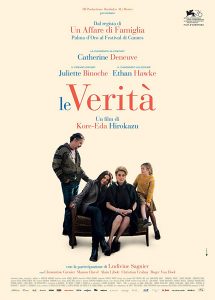
Director Hirokazu Kore-eda’s first foray into filmmaking outside Japan tells the story of an aging actress (Catherine Deneuve) who’s coming to grips with her life in the wake of writing her memoir, one that her daughter (Juliette Binoche) claims is full of oversights, exaggerations and lies. As they match wits in what has been a life-long struggle, the grand dame of French cinema takes on a new movie role in which she plays a character not unlike her daughter, giving her an opportunity to see things from a different perspective. Meanwhile, daughter dearest also discovers that her memory may be fallible and that her recollections of a rotten childhood may not be as accurate as she has long thought.
Deneuve gives a command performance, award-worthy for sure, and the script is full of ample, laugh-out-loud wit. The fine ensemble cast, featuring Binoche and Ethan Hawke, among others, provides excellent support for the film’s leading lady, serving as an excellent “audience” for her latest “performance.” Admittedly, the pacing in the final act could use some shoring up, but this otherwise-delightful offering is well worth the time. (4/5)

An aging actress (Catherine Deneuve, second from right) is forced to come to terms with her daughter (Juliette Binoche, second from left), along with her son-in-law (Ethan Hawke, left) and granddaughter (Clémentine Grenier, right), in director Hirokazu Kore-eda’s “The Truth” (“Le verità”),
“The Fever” (“A Febre”) (Brazil/France/Germany)
This richly metaphorical clash-of-cultures offering tells the story of an indigenous Brazilian security guard (Regis Myrupu) who leaves his village to work in the industrial port city of Manaus, where he becomes afflicted with a mysterious fever. In searching for the cause of his ailment, the protagonist scours myriad aspects of his life to figure out how to get well, a quest that symbolically reflects wider issues not only for himself, but also for the different peoples of an entire nation.
Filmmaker Maya Da-Rin, winner of the festival’s award for best director, presents an almost-poetic tale of the mystical and material. The film’s deliberately slow pacing (appropriate given the nature of the picture’s subject matter) can be a tad trying at times, but, if viewers can overlook this aspect, they’ll be treated to a moving and thought-provoking story brought to life by a fine ensemble cast of native, non-professional actors. A deceptively affecting offering and worthy Gold Hugo nominee. (4/5)

An indigenous Brazilian security guard (Regis Myrupu, right) seeks to discover the source of a mysterious illness in “The Fever” (“A Febre”), festival winner for best director Maya Da-Rin.
“Deerskin” (“Le daim”) (France)
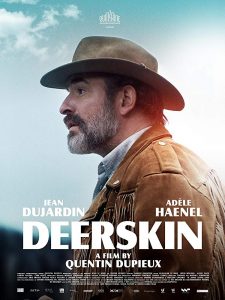
Arguably the funniest one-joke movie I’ve ever seen, this absurd dark comedy from director Quentin Dupieux follows the strange exploits of a budding serial murderer (Jean Dujardin) who becomes obsessed with a newly acquired second-hand deerskin jacket that gives him a “killer” appearance. When the jacket begins “speaking” to him, however, things go from weird to truly bizarre, especially when it tells him that it wants to be the only jacket in the world, prompting its owner to look for ways to eliminate all of its competition – and at any cost.
This macabre offering is definitely not for everyone. Some of the violence may be a bit much for sensitive viewers, and the story could be just too strange for those who like their cinema a bit more conventional. But for those with off-the-wall tastes who like their horror films with a humorous edge, this one will definitely suit you. (4/5)

A budding serial killer (Jean Dujardin) starts slipping over the edge when he begins having bizarre conversations with his jacket as seen in the edgy, off-the-wall dark comedy, “Deerskin” (“Le daim”).
“The Whistlers” (“La Gomera”) (Romania/France/Germany)
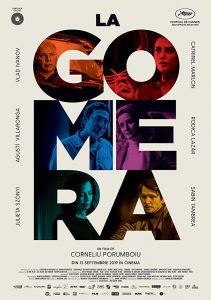
This stylish, clever crime caper features an intriguing game of cat and mouse involving crooked Romanian detectives, ruthless Spanish gangsters, a pious Eastern Orthodox matriarch and a system of communications employing an ancient whistling language created in the Canary Islands. It’s a tale that combines its diverse elements to keep viewers guessing right up to the end.
Drawing upon dry humor, an operatic soundtrack and a series of stunning revelations, this Palme d’Or nominee from this year’s Cannes Film Festival takes viewers across three continents in a race aimed at trying to figure out who’s trying to outdo who (and why). While the narrative occasionally gets a little too convoluted for its own good, director Corneliu Porumboiu’s latest is otherwise a sinister but fun, visually dazzling romp. (4/5)

Crooked Romanian detectives, ruthless Spanish gangsters and a strange whistling language invented in the Canary Islands all combine for a clever, stylish crime drama in “The Whistlers” (“La Gomera”).
“The Wild Goose Lake” (“Nan Fang Che Zhan De Ju Hui”) (China/France)
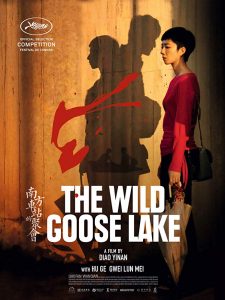
This sometimes-campy, sometimes-intense, often-quirky crime drama about a motorcycle thief (Ge Hu) on the run from authorities and rival thugs features an eclectic mix of elements and influences ranging from contemporary Chinese cinema to French crime dramas to martial arts movies and even a pinch of Quentin Tarantino Lite. The picture’s “I-can’t-believe-they-just-did-that” humor adds spice and diversion, keeping the story lively, fresh and entertaining.
However, while the first half sails along well, the back end tends to meander somewhat, dragging out the story toward an ending that’s more than a little predictable. With better editing and a tighter script, especially in the concluding sequences, director Yi’nan Diao’s Palme d’Or nominee could have been a knock-out, but, unfortunately, it limps across the finish line instead of racing past it. (3/5)

A motorcycle thief (Ge Hu) on the run from authorities and rival thugs provides the narrative for the sometimes-campy, sometimes-intense crime drama, “The Wild Goose Lake” (“Nan Fang Che Zhan De Ju Hui”).
“Corpus Christi” (Poland/France)
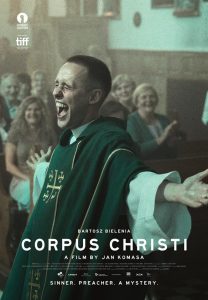
When a paroled juvenile inmate (Bartosz Bielenia) who desires to become a priest gets an opportunity to assume the identity of one without seminary training, he jumps at the chance, an act that allows him to see how well he’s able to follow a calling that has been detoured by his past. It’s a challenging undertaking that finds him constantly under the microscope as he’s pursued by ghosts of his prison days and scrutinized by parishioners who question his unconventional style of ministering.
However, while director Jan Komasa’s Gold Hugo nominee has its moments – most notably Bielenia’s stellar turn in the festival’s best actor performance – the overall package tries to incorporate too many plot lines and cover far too much ground, leaving certain important aspects (especially the protagonist’s motivations and back story) underdeveloped. A pared-down treatment would have benefitted this noble attempt nicely, making for a more focused and meaningful offering. (3/5)

A paroled juvenile offender who longs to be a priest (Bartosz Bielenia) gets an opportunity to explore his calling in director Jan Komasa’s “Corpus Christi.”
“Mr. Jones” (Poland/UK/Ukraine)
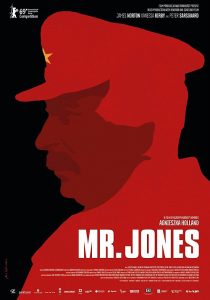
This fact-based biopic chronicles the efforts of British diplomat-turned-reporter Gareth Jones (James Norton) in attempting to expose Soviet dictator Josef Stalin’s genocide of Ukrainians in the years prior to World War II, an initiative that met with severe and surprising (and self-serving) opposition in Western diplomatic and journalistic circles. However, his intrepid efforts eventually brought to light a tragedy driven by opportunism and greed, both by its architect and those who benefitted by complicitly looking the other way.
Jones’s saga is a little-known story that screams qualities like “urgency” and “outrage,” traits that, unfortunately, don’t come across nearly as strongly in the film as they should have. Director Agnieszka Holland tends to understate the nature of the narrative, never quite raising it to the level of shock and engagement that the subject matter deserves, frequently muddling the flow of the story with extraneous, if not irrelevant, subplots. Think of this one as a compelling story with regrettably less-than-compelling treatment. (3/5)

The fact-based story of diplomat-turned-journalist Gareth Jones (James Norton) and his efforts to expose Josef Stalin’s genocide of Ukrainians in the years before World War II provides the story line for director Agnieszka Holland’s latest release, “Mr. Jones.”
“Jesus Shows You the Way to the Highway” (Spain/Estonia/Ethiopia/Latvia/Romania)
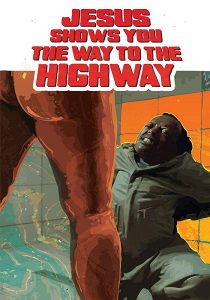
Devotees of the weird will appreciate this uniquely and utterly strange offering about a pair of CIA agents (Daniel Tadesse, Augustín Mateo) sent into cyberspace to destroy a computer virus, only to find that the truth is even more bizarre than thought. The result is one of the most inventive and outrageous films imaginable, easily leaving one’s mouth agape and head suitably scratched.
Through a mix of inventive animation, various photographic techniques and off-the-wall humor, director Miguel Llansó takes viewers on a wild, wild ride through a story that ultimately makes little sense but that generally entertains in its own special way. The picture has a tendency to get a little too wrapped up in its own quirkiness at times, coming across like “The Hitchhiker’s Guide to the Galaxy” (2005) or an episode of “Dr. Who” on steroids. But, if you can overlook that, you’ll get a lot of hearty laughs out of this one. (3/5)

Two CIA agents sent into cyberspace to destroy a computer vice have an unexpected encounter with “Jesus” (Guillermo Llansó, center) in the wacky comedy, “Jesus Shows You the Way to the Highway.”
“Atlantics” (“Atlantique”) (France/Senegal/Belgium)
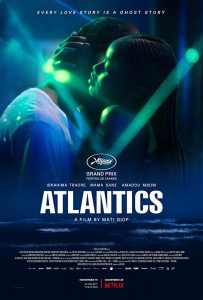
Despite an award-winning pedigree, this mystical Senegalese romance/ghost story never quite gels into a cohesive (and, at times, understandable) whole. While the emotions seem sincere enough and the lyrical cinematography is beautiful to look at, the muddled plot of director Mati Diop’s debut feature is often befuddling as it attempts to blend unrequited love, social commentary and otherworldly elements into a single narrative.
Many of those attending my screening stepped away from it noticeably scratching their heads. Perhaps something was lost in translation. Perhaps the subtlety is a little too understated for its own good. Or perhaps the story was reaching for something it couldn’t adequately capture. In any event, this missed cinematic opportunity is an easily overlooked offering. (2/5)

Ada (Marne Bineta Sane), a bride-to-be promised to a man she doesn’t love, longs to pursue the romance of her choice, a quest shrouded in mystical influences in director Mati Diop’s debut feature, “Atlantics” (“Atlantique”).
“Fire Will Come” (“O que arde”) (Spain/France/Luxembourg)
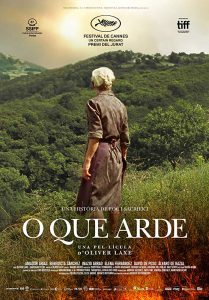
Gorgeous cinematography aside, this leaden-paced tale of a convicted arsonist (Amador Arias) who’s paroled from prison and returns to his rural Spanish homeland where a mysterious new forest fire breaks out struggles to find a story amidst its meandering narrative. Stunning landscape shots and extensive spans of silence (a contributing element to the picture’s award-winning sound design) may be aesthetically appealing, but they dominate to the point of deterring the film’s telling of an engaging and coherent story.
While director Oliver Laxe tries to use this film to make an environmental statement (albeit not all that effectively), it’s not enough to save this otherwise-woefully underdeveloped Gold Hugo nominee, despite its accolades, including a win and a nomination in the Un Certain Regard competition at this year’s Cannes Film Festival. Skip this one, and you won’t miss much. (1/5)

A mysterious forest fire believed set by a paroled arsonist sets the stage for the story in director Oliver Laxe’s award-winning “Fire Will Come” (“O que arde”).
Copyright © 2019, by Brent Marchant. All rights reserved.
Wrapping up the Chicago Film Festival
One of the great joys of reviewing movies is the opportunity to attend film festivals. They offer moviegoers a chance to see multiple offerings in myriad genres from countries all over the globe, featuring everything from little-known independent productions to Hollywood blockbusters. And so it is with my hometown event, the Chicago International Film Festival, which just recently completed its 55th edition.
The Chicago festival just keeps getting better and better every year. I’ve attended many of the festivals over the past 40 years (I started attending when I was 2…), and I’ve seen vast improvements in programming and staging in that time, efforts that have truly made this a world class event. Over 12 days, I screened 15 films, many of which were good to excellent.
With that in mind, I offer my thoughts and impressions on the pictures I saw. My scores, which are based on the 1-5 rating scale used by festival attendees, appear at the end of each of my evaluations. Lengthier reviews of some of these releases will be featured in future blog entries.
So sit back, relax and enjoy my journey through an inspired field of movies. And, if you should ever attend this event in the future, be sure to look for me on the red carpet. I’ll be there!
Photo by Trevor Laster.
“Babyteeth” (Australia)
The seemingly unlikely romance between a seriously ill teenager (Eliza Scanlen) and a junkie/small-time drug dealer (Toby Wallace) outrages her parents (Ben Mendelsohn, Essie Davis), despite the fact that mom and dad each engage in their own bad behavior and have more than their own share of issues. Yet, as this story plays out, it becomes apparent that those who are supposed to provide guidance can learn much from those they’re guiding.
With a tautly written script, a superb ensemble cast (especially Mendelsohn in one of his best performances), creative cinematography and a more than ample supply of quirky humor, this excellent debut feature from director Shannon Murphy ushers the audience through a minefield of emotions (especially in the film’s concluding sequence), leaving viewers moved – and drained – by picture’s end. Think of this as a slightly off-the-wall, bittersweet and decidedly more dysfunctional version of “Terms of Endearment” (1983), and you have the idea. A superb offering from a promising new talent. Don’t miss it. (5/5)
A seriously ill teenager (Eliza Scanlen) ponders an uncertain future in director Shannon Murphy’s debut feature, “Babyteeth.”
“Ordinary Love” (UK)
This sensitive, highly personal look at what a breast cancer diagnosis does to longtime happily married couple (Lesley Manville, Liam Neeson) evokes heartfelt emotions as the story wends its way through the ups and downs of coping with illness and an uncertain future. And, coming in the wake of the tragic and unexpected death of their only child, this latest burden is made all the more difficult for a wife and mother facing her own mortality and a husband and father staring down the prospect of being alone.
Directors Lisa Barros D’sa and Glenn Leyburn draw excellent award-worthy performances out of their two protagonists (especially Manville), presenting the audience with a couple who exude a comfortable familiarity at both their best and worst. The picture’s simple but effective cinematography and suitably fitting soundtrack greatly enhance the mood of the story, taking a subject that’s been addressed on film before and elevating it to an entirely new level of candor and viewer intimacy. A moving, exceedingly touching experience to be sure. (5/5)
A breast cancer patient (Lesley Manville, right) and her concerned husband (Liam Neeson, left) struggle to cope with the changes to their long-tenured relationship in “Ordinary Love.”
“Spider” (“Araña”) (Chile)
When a believed-dead right-wing Chilean nationalist (Marcelo Alonso) reappears decades after working with the radical Fatherland and Liberty movement to overthrow the Communist government of President Salvadore Allende, old ghosts from the past re-emerge from the woodwork, circumstances that create havoc for the story’s principals both personally and publicly. Told through a series of flashbacks seamlessly woven into the present-day narrative, the film reveals a complex political struggle that spills over from the day’s public events and into the personal lives of the movement’s participants (and vice versa), both in the past and the present.
Director Andrés Wood delivers an engaging, edge-of-your-seat thriller with both personal and public implications, as well as a message that’s just as important for today as it was in the past, and not just in Chile. “Spider,” a nominee for the festival’s Gold Hugo Award, the event’s highest honor, is yet another excellent example of the work coming out of one of the world’s foremost emerging film industries. (5/5)
Right-wing radicals (Maria Valverde, left, and Gabriel Urzúa, right) work on planning strategies to overthrow Chile’s leftist leadership in the early 1970s in director Andrés Wood’s Gold Hugo-nominated offering, “Spider” (“Araña”).
“Balloon” (“Qi Qui”) (China)
This paradoxical fable explores what happens when long-cherished spiritual beliefs collide with sociopolitical public policy in Tibet during the days of China’s one-child birth policy. To say more would reveal too much, but suffice it to say that the picture weaves a lush tapestry of thoughts and feelings that grows ever-more captivating the further one gets into its narrative.
Poetically told by director Pema Tseden, with inventive and often-breathtaking cinematography, an elegant soundtrack, gentle humor and an ethereal storytelling approach, this simple but stirring tale moves viewers in heartfelt ways at both ends of the emotional scale. While the pacing of this Gold Hugo nominee and best screenplay winner is a tad sluggish in the middle, that’s easily overlooked in light of everything else this excellent release has to offer. (5/5)
The clash of traditional spirituality and modern government policy affect three generations of a Tibetan family in director Pema Tseden’s “Balloon” (“Qi Qui”).
“The Father” (“Bashtata”) (Bulgaria/Greece)
This touching charmer examines how a father (Ivan Savov) and son (Ivan Barnev) deal with the loss of their wife and mother (Maria Bakalova) while simultaneously sorting out long-simmering differences between them. But such serious matters get tabled when dad is convinced that his beloved is trying to communicate with him from the other side and seeks the aid of a shady mystic to learn what messages mom has for him, much to the consternation of his pragmatic son, who’s further burdened by challenges at work and the many moods of a sensitive pregnant wife (Margita Gosheva).
The result is a zany saga that combines both hilarious and meaningful moments filled with heartfelt emotion and more than a few startling synchronicities, all in an unlikely road trip/buddy film format. The picture’s deft fusion of comedy and drama weaves a captivating tale, one with both raw emotion and ample laugh-out-loud humor. A truly unexpected gem from the husband and wife directorial team of Kristina Grozeva and Petar Valchanov. (5/5)
A put-upon son (Ivan Barnev, left) attempting to help his out-of-control father on a zany road trip ends up in an array of wacky situations, such as being forced to hitchhike in a hearse, in the hilarious buddy film, “The Father” (“Bashtata”).
“The Truth” (“Le verità”) (France/Japan)
Director Hirokazu Kore-eda’s first foray into filmmaking outside Japan tells the story of an aging actress (Catherine Deneuve) who’s coming to grips with her life in the wake of writing her memoir, one that her daughter (Juliette Binoche) claims is full of oversights, exaggerations and lies. As they match wits in what has been a life-long struggle, the grand dame of French cinema takes on a new movie role in which she plays a character not unlike her daughter, giving her an opportunity to see things from a different perspective. Meanwhile, daughter dearest also discovers that her memory may be fallible and that her recollections of a rotten childhood may not be as accurate as she has long thought.
Deneuve gives a command performance, award-worthy for sure, and the script is full of ample, laugh-out-loud wit. The fine ensemble cast, featuring Binoche and Ethan Hawke, among others, provides excellent support for the film’s leading lady, serving as an excellent “audience” for her latest “performance.” Admittedly, the pacing in the final act could use some shoring up, but this otherwise-delightful offering is well worth the time. (4/5)
An aging actress (Catherine Deneuve, second from right) is forced to come to terms with her daughter (Juliette Binoche, second from left), along with her son-in-law (Ethan Hawke, left) and granddaughter (Clémentine Grenier, right), in director Hirokazu Kore-eda’s “The Truth” (“Le verità”),
“The Fever” (“A Febre”) (Brazil/France/Germany)
This richly metaphorical clash-of-cultures offering tells the story of an indigenous Brazilian security guard (Regis Myrupu) who leaves his village to work in the industrial port city of Manaus, where he becomes afflicted with a mysterious fever. In searching for the cause of his ailment, the protagonist scours myriad aspects of his life to figure out how to get well, a quest that symbolically reflects wider issues not only for himself, but also for the different peoples of an entire nation.
Filmmaker Maya Da-Rin, winner of the festival’s award for best director, presents an almost-poetic tale of the mystical and material. The film’s deliberately slow pacing (appropriate given the nature of the picture’s subject matter) can be a tad trying at times, but, if viewers can overlook this aspect, they’ll be treated to a moving and thought-provoking story brought to life by a fine ensemble cast of native, non-professional actors. A deceptively affecting offering and worthy Gold Hugo nominee. (4/5)
An indigenous Brazilian security guard (Regis Myrupu, right) seeks to discover the source of a mysterious illness in “The Fever” (“A Febre”), festival winner for best director Maya Da-Rin.
“Deerskin” (“Le daim”) (France)
Arguably the funniest one-joke movie I’ve ever seen, this absurd dark comedy from director Quentin Dupieux follows the strange exploits of a budding serial murderer (Jean Dujardin) who becomes obsessed with a newly acquired second-hand deerskin jacket that gives him a “killer” appearance. When the jacket begins “speaking” to him, however, things go from weird to truly bizarre, especially when it tells him that it wants to be the only jacket in the world, prompting its owner to look for ways to eliminate all of its competition – and at any cost.
This macabre offering is definitely not for everyone. Some of the violence may be a bit much for sensitive viewers, and the story could be just too strange for those who like their cinema a bit more conventional. But for those with off-the-wall tastes who like their horror films with a humorous edge, this one will definitely suit you. (4/5)
A budding serial killer (Jean Dujardin) starts slipping over the edge when he begins having bizarre conversations with his jacket as seen in the edgy, off-the-wall dark comedy, “Deerskin” (“Le daim”).
“The Whistlers” (“La Gomera”) (Romania/France/Germany)
This stylish, clever crime caper features an intriguing game of cat and mouse involving crooked Romanian detectives, ruthless Spanish gangsters, a pious Eastern Orthodox matriarch and a system of communications employing an ancient whistling language created in the Canary Islands. It’s a tale that combines its diverse elements to keep viewers guessing right up to the end.
Drawing upon dry humor, an operatic soundtrack and a series of stunning revelations, this Palme d’Or nominee from this year’s Cannes Film Festival takes viewers across three continents in a race aimed at trying to figure out who’s trying to outdo who (and why). While the narrative occasionally gets a little too convoluted for its own good, director Corneliu Porumboiu’s latest is otherwise a sinister but fun, visually dazzling romp. (4/5)
Crooked Romanian detectives, ruthless Spanish gangsters and a strange whistling language invented in the Canary Islands all combine for a clever, stylish crime drama in “The Whistlers” (“La Gomera”).
“The Wild Goose Lake” (“Nan Fang Che Zhan De Ju Hui”) (China/France)
This sometimes-campy, sometimes-intense, often-quirky crime drama about a motorcycle thief (Ge Hu) on the run from authorities and rival thugs features an eclectic mix of elements and influences ranging from contemporary Chinese cinema to French crime dramas to martial arts movies and even a pinch of Quentin Tarantino Lite. The picture’s “I-can’t-believe-they-just-did-that” humor adds spice and diversion, keeping the story lively, fresh and entertaining.
However, while the first half sails along well, the back end tends to meander somewhat, dragging out the story toward an ending that’s more than a little predictable. With better editing and a tighter script, especially in the concluding sequences, director Yi’nan Diao’s Palme d’Or nominee could have been a knock-out, but, unfortunately, it limps across the finish line instead of racing past it. (3/5)
A motorcycle thief (Ge Hu) on the run from authorities and rival thugs provides the narrative for the sometimes-campy, sometimes-intense crime drama, “The Wild Goose Lake” (“Nan Fang Che Zhan De Ju Hui”).
“Corpus Christi” (Poland/France)
When a paroled juvenile inmate (Bartosz Bielenia) who desires to become a priest gets an opportunity to assume the identity of one without seminary training, he jumps at the chance, an act that allows him to see how well he’s able to follow a calling that has been detoured by his past. It’s a challenging undertaking that finds him constantly under the microscope as he’s pursued by ghosts of his prison days and scrutinized by parishioners who question his unconventional style of ministering.
However, while director Jan Komasa’s Gold Hugo nominee has its moments – most notably Bielenia’s stellar turn in the festival’s best actor performance – the overall package tries to incorporate too many plot lines and cover far too much ground, leaving certain important aspects (especially the protagonist’s motivations and back story) underdeveloped. A pared-down treatment would have benefitted this noble attempt nicely, making for a more focused and meaningful offering. (3/5)
A paroled juvenile offender who longs to be a priest (Bartosz Bielenia) gets an opportunity to explore his calling in director Jan Komasa’s “Corpus Christi.”
“Mr. Jones” (Poland/UK/Ukraine)
This fact-based biopic chronicles the efforts of British diplomat-turned-reporter Gareth Jones (James Norton) in attempting to expose Soviet dictator Josef Stalin’s genocide of Ukrainians in the years prior to World War II, an initiative that met with severe and surprising (and self-serving) opposition in Western diplomatic and journalistic circles. However, his intrepid efforts eventually brought to light a tragedy driven by opportunism and greed, both by its architect and those who benefitted by complicitly looking the other way.
Jones’s saga is a little-known story that screams qualities like “urgency” and “outrage,” traits that, unfortunately, don’t come across nearly as strongly in the film as they should have. Director Agnieszka Holland tends to understate the nature of the narrative, never quite raising it to the level of shock and engagement that the subject matter deserves, frequently muddling the flow of the story with extraneous, if not irrelevant, subplots. Think of this one as a compelling story with regrettably less-than-compelling treatment. (3/5)
The fact-based story of diplomat-turned-journalist Gareth Jones (James Norton) and his efforts to expose Josef Stalin’s genocide of Ukrainians in the years before World War II provides the story line for director Agnieszka Holland’s latest release, “Mr. Jones.”
“Jesus Shows You the Way to the Highway” (Spain/Estonia/Ethiopia/Latvia/Romania)
Devotees of the weird will appreciate this uniquely and utterly strange offering about a pair of CIA agents (Daniel Tadesse, Augustín Mateo) sent into cyberspace to destroy a computer virus, only to find that the truth is even more bizarre than thought. The result is one of the most inventive and outrageous films imaginable, easily leaving one’s mouth agape and head suitably scratched.
Through a mix of inventive animation, various photographic techniques and off-the-wall humor, director Miguel Llansó takes viewers on a wild, wild ride through a story that ultimately makes little sense but that generally entertains in its own special way. The picture has a tendency to get a little too wrapped up in its own quirkiness at times, coming across like “The Hitchhiker’s Guide to the Galaxy” (2005) or an episode of “Dr. Who” on steroids. But, if you can overlook that, you’ll get a lot of hearty laughs out of this one. (3/5)
Two CIA agents sent into cyberspace to destroy a computer vice have an unexpected encounter with “Jesus” (Guillermo Llansó, center) in the wacky comedy, “Jesus Shows You the Way to the Highway.”
“Atlantics” (“Atlantique”) (France/Senegal/Belgium)
Despite an award-winning pedigree, this mystical Senegalese romance/ghost story never quite gels into a cohesive (and, at times, understandable) whole. While the emotions seem sincere enough and the lyrical cinematography is beautiful to look at, the muddled plot of director Mati Diop’s debut feature is often befuddling as it attempts to blend unrequited love, social commentary and otherworldly elements into a single narrative.
Many of those attending my screening stepped away from it noticeably scratching their heads. Perhaps something was lost in translation. Perhaps the subtlety is a little too understated for its own good. Or perhaps the story was reaching for something it couldn’t adequately capture. In any event, this missed cinematic opportunity is an easily overlooked offering. (2/5)
Ada (Marne Bineta Sane), a bride-to-be promised to a man she doesn’t love, longs to pursue the romance of her choice, a quest shrouded in mystical influences in director Mati Diop’s debut feature, “Atlantics” (“Atlantique”).
“Fire Will Come” (“O que arde”) (Spain/France/Luxembourg)
Gorgeous cinematography aside, this leaden-paced tale of a convicted arsonist (Amador Arias) who’s paroled from prison and returns to his rural Spanish homeland where a mysterious new forest fire breaks out struggles to find a story amidst its meandering narrative. Stunning landscape shots and extensive spans of silence (a contributing element to the picture’s award-winning sound design) may be aesthetically appealing, but they dominate to the point of deterring the film’s telling of an engaging and coherent story.
While director Oliver Laxe tries to use this film to make an environmental statement (albeit not all that effectively), it’s not enough to save this otherwise-woefully underdeveloped Gold Hugo nominee, despite its accolades, including a win and a nomination in the Un Certain Regard competition at this year’s Cannes Film Festival. Skip this one, and you won’t miss much. (1/5)
A mysterious forest fire believed set by a paroled arsonist sets the stage for the story in director Oliver Laxe’s award-winning “Fire Will Come” (“O que arde”).
Copyright © 2019, by Brent Marchant. All rights reserved.